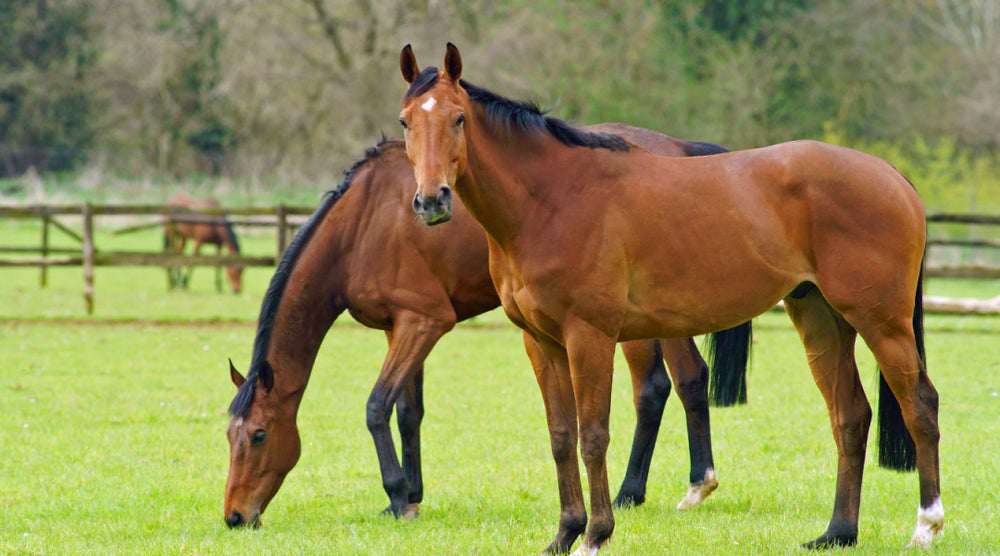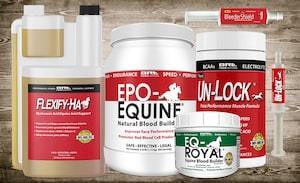
Your horse’s health and athletic performance depend on his respiratory health. Whether he already has a respiratory condition or you want to prevent potential issues from arising, these seven simple steps can help to keep him breathing easily.
- Maximize Turnout. Stables are full of dust and irritants, which can negatively impact your horse’s respiratory health. Maximizing the amount of time that he is turned out each day is a great first step toward helping to keep him breathing easier.
-
Avoid Round Bales. Horses tend to stick their noses deep into round bales, inhaling dust as they eat. Avoid feeding round bales in the pasture, and don’t use any type of hay feeder that creates large piles of hay. Instead, feed hay on the ground, and spread it out to minimize dust. It’s best if you can feed hay in thin layers on several stall mats out in your pasture, keeping it up out of the mud but allowing horses to pick through it.
Use this same method when feeding horses indoors. Avoid hay nets and hay feeders, and spread hay on your horse’s stall floor instead.
If you have a hayloft, avoid tossing down hay when horses are in the barn. This generates a tremendous amount of dust that can stay in the air for about a half hour. Schedule times to toss down hay so that the air has time to clear before your horses come inside.
- Clean Stalls Regularly. Ammonia can irritate your horse’s respiratory system, so frequent stall cleaning is important. Like throwing down hay, stall cleaning needs to be carefully scheduled. Clean stalls only when horses are out of the barn. If you sweep your aisle after you clean, water down the aisle to help reduce the amount of dust generated. Avoid using leaf blowers, which can stir up even more dust.
-
Soak or Steam Hay. Dusty hay can increase coughing and irritation, so purchase the best hay you can find. Soaking or steaming hay can cut down on dust and irritants. Either option can take time, and soaking can be difficult in the winter. A heated tack room and a system like the Haygain steamer can make this easier.
If you can’t soak or steam your hay, consider using other types of hay products. Soaked hay cubes or hay pellets can help minimize dust. They also offer the benefit of helping to increase your horse’s water intake, which can be particularly valuable during the winter.
Grain is another potential source of dust, especially if you’re feeding large amounts of pelleted grain. Wet down your horse’s grain just before you feed it, or add it into soaked hay cubes or pellets.
- Use Low-Dust Bedding. Common types of bedding like wood shavings or straw can be high in dust and irritants. Look for a low-dust bedding that’s absorbent and free of mold. Large wood shavings can have lower dust content, though shredded paper or cardboard can also be ideal. Avoid using deep litter systems, which can exacerbate dust.
- Water Your Arena. Keep up with watering your arena to prioritize your horse’s respiratory health while you’re riding. Installing sprinklers along the ringside or bringing in a low-dust footing alternative can help to reduce dust. If you ride in an indoor arena, keep the windows and doors open as much as possible to improve air quality.
-
Feed BleederShield. If your horse has EIPH and undergoes intense exercise and training, BleederShield can support healthy lung function and help reduce bleeding. BleederShield promotes the repair of lungs and supports both the lungs and blood vessels during workouts and competitions. It’s ideal for racehorses, harness racers, barrel racers, eventers and more — and it’s 100% drug-free.
You can try BleederShield risk-free, thanks to BRL Equine’s 90-Day Money-Back Guarantee. When incorporated into these other six healthy lung management tips, it can help promote respiratory health in your horse.
Top trainers, owners and competitors rely on BRL Equine products to help their horses perform at their very best. You can get the same great results! Our all-natural equine nutritional supplements really work... guaranteed or your money back!





Also in Horse Tips and More
Top 10 Ways to Show Your Horse You’re Thankful For Him
November 01, 2021
View full article →
5 Ways to Prepare Your Barn For Summer
May 03, 2021
View full article →
Your New Spring Horse Health Checklist
March 12, 2021
View full article →